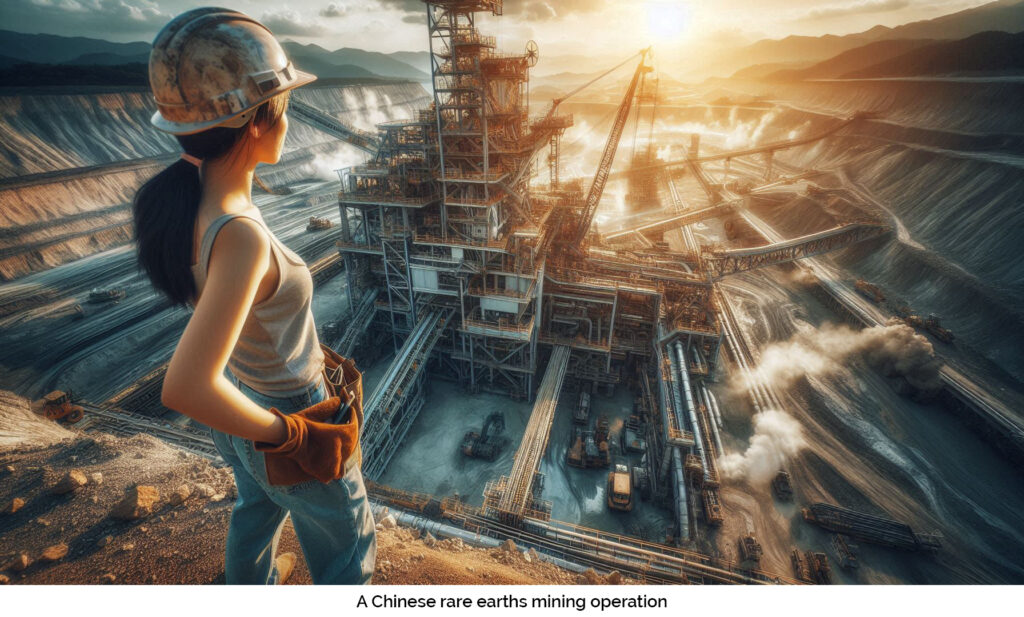Ever since the Pandemic, the West has awakened to the dangers posed by China’s dominance in strategic minerals.
At the moment, China processes and refines:
40% of the world’s nickel;
50 – 60% copper;
65% for lithium;
73% for cobalt;
90% + for magnesium, graphite and rare earths.
If China were a benign liberal democracy like Japan, this dominance would not be an issue. But alas, the country is determined to supplant the United States as the dominant global superpower. It now has the world’s biggest navy, with more aircraft carriers under way. Its nuclear arsenal and rocket forces are growing by leaps and bounds.
In the South China Sea, where China unilaterally claims 90% of the waters, Chinese warships shadow American vessels, while beneath the surface, nuclear-powered submarines from both nations silently stalk each other.
A SEA CHANGE IN POLICY
Everything the West believed about China’s peaceful rise was wrong. Now, there is a broad consensus that China is actively undermining key elements of the international rules-based order.
This is the inescapable geopolitical reality, which in turn informs and influences decisions of resource-rich countries such as Canada and Australia. They now cast a critical eye on any proposed Chinese resource acquisitions that involve companies under their jurisdictions.
And so it should not come as a surprise that Zijin Mining’s tentative $130 million (15% stake and board representation) investment in Solaris Resources was subjected to national security review by Ottawa.
Solaris owns a substantial copper deposit in Ecuador, a country where China exerts enormous influence. We all know what happened: Solaris cancelled the financing because it would not get approval from the government within the timeframe it expected.
A smaller financing ($16.9 M) involving Chinese companies and SRG Mining suffered a similar fate.
In light of these events, indignation erupted. Bay Street lawyers and executives questioned the appropriateness of the government’s review and mused whether their companies should re-domicile to other jurisdictions to escape government scrutiny.
THE WEST’S NEW STRATEGY: CHIPPING AWAY AT CHINA’S DOMINANCE
Is the West’s desire to be more self-reliant on certain critical minerals a good or bad thing for the mining industry?
Overall, the net benefit to the industry has been staggering. The CDN $130 million that Solaris was unable to complete pales in comparison to the tens of billions of dollars in various forms of support that the industry receives.
Here are some examples:
- U.S. $2.26 billion conditional loan from the U.S. Department of Energy to support Lithium Americas’ Thacker Pass lithium project in Nevada.
- U.S. $1.8 billion potential loan from the Export-Import Bank of the United States in support of Perpetua Resources’ Stibnite Gold project in Idaho. The project also contains antimony, a critical mineral.
- US $325 million potential loan from Export-Import Bank for Graphite One. This is in addition to a previous outright grant of $37.5 million from the U.S Department of Defence.
- U.S. $150 million investment in Serra Verde Group from the Minerals Security Partnership, a coalition of 12 Western countries plus the European Union.
- In Europe, Verde Magnesium and Euro Manganese are poised to chip away at China’s dominance in these metals.
- In Texas, Lynas Rare Earths with the support from the Department of Defense and MP Materials are expected to make the U.S more self-sufficient in certain critical minerals.
The catalogue of new and proposed investments by Western governments is by no means complete. This quick survey suggests that for every dollar of Chinese money turned away, $10 or more of new investments flow into the industry.
MOVE TO ECUADOR: ILL-ADVISED
Solaris has recently announced it is transitioning its head office to Ecuador. In case you’re not aware, Ecuador is a desperately poor country plagued by chronic security problems, including rising crime rates, gang violence and drug trafficking.
Presumably the rationale for such a move is to lay the groundwork for the day when it can sell its asset to a Chinese buyer without scrutiny from the Canadian government. After all, there are two humongous Chinese state-owned enterprises — Tongling Nonferrous Metals Group and China Railway Construction Corp. — already operating a copper mine there.
Even if an offer eventually materializes, it’s doubtful that simply relocating the head office will exempt Solaris from oversight by Ottawa.
Or the mighty Uncle Sam.
With a listing on the New York Stock Exchange, Solaris is also subject to U.S. laws and regulations. Multinational European companies (Siemens, Alstom, Veon, etc.), whose stocks trade on the NYSE, have paid record fines for violating the US Foreign Corrupt Practices Act.
But even if such relocation makes a transaction with a Chinese company possible, it carries significant ethical and moral implications. Before making a final decision, management should ask themselves:
“Is our allegiance to Canada, or China?”
“Are we, in effect, skirting the intent and purpose of our government’s laws concerning foreign investment for financial gain?”
“Shouldn’t we be grateful for the rule of law, the freedoms we enjoy, and the countless opportunities that Canada has provided us?”
“If Canada has been good to us, our families, and our ancestors, then why turn our backs on it?”
Hai Van Le is the author of Into the Unknown and Managing Director of Sattva Global Advisors, Inc., a financial advisory firm focused on Strategic Partnership, Corporate Finance and M&A in the mining industry.









